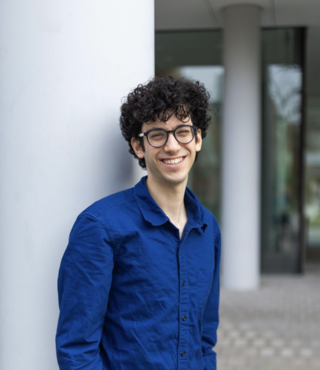Roy Kohavi ('26)

As a political science major from Seattle, Washington, pursuing an Intensive Education Studies Certificate, Roy Kohavi (any pronouns) sees education as more than just teaching—it’s about power, policy, and priorities. “Public education holds immense power in our society,” Roy says. “I think it’s undervalued, underfunded, and disrespected, even though study after study shows it’s one of the most effective tools we have.”
Now a junior in Saybrook College, Roy’s passion for education began in childhood. They were drawn to teaching early on, designing holiday trivia games for their family and grading responses. In high school, they became a youth scout counselor, working with fourth graders—a role that solidified their love for facilitating discussions and supporting student growth.
At Yale, Roy’s academic interests center on major debates in education, from the “culture wars” over curriculum to standardized testing. “I’m passionate about how schools are being pressured to whitewash history and defund studies on different cultures,” they explain, citing the removal of African American Studies courses and legislation like the Don’t Say Gay bill. “It’s crucial to protect cultural and identity-sustaining programs in schools.” They are also critical of school privatization, arguing that it diverts resources from public education.
For their capstone project, Roy plans to examine sex education in American schools. “Sex ed is a symptom of a larger issue—schools aren’t prioritizing student well-being,” they say. “And it’s not just the schools’ fault. There are so many factors at play—federal and state funding, school boards, and political pressure.” To tackle the topic creatively, Roy hopes to write a young adult novel that subtly integrates sex education. “When kids are given dry, clinical manuals, they tune out. But storytelling has the power to engage them in ways current instruction doesn’t.”
Roy’s field experiences have deepened their understanding of education in practice. As a tutor with New Haven Reads, they worked with a fourth grader struggling with literacy. “Almost everyone there was below grade level, but I saw improvement over time,” they recall. “I was also taking a class about the reading crisis in America, and I realized—we’re teaching reading the wrong way.” This summer, they will take on a new challenge as an instructor for Yale Young Global Scholars in the Politics, Law, and Economics track. “I’ll be leading seminars, mentoring students, and facilitating discussions. Most of the students are international, and I’m excited to see how this teaching experience will be different.”
Among Roy’s favorite EDST experiences is Effective Teaching: Secondary Humanities Classroom with Professor Melissa Scheve. “Boy, was this a fun class,” they reminisce. “She taught us the way she teaches her middle school students, but with an added layer where we analyzed her teaching methods in real time.” They also fondly recall hands-on projects in EDST 261 with TZB, from felting to a Lunchables-based lesson on school nutrition.
Looking ahead, Roy hopes to be at the intersection of education, law, and policy. “I’m thinking about applying to law school. I want to bring my passion for teaching into being a law professor,” they say. Whether through research, advocacy, or teaching, Roy is determined to fight for an education system that prioritizes students, teachers, and equity.